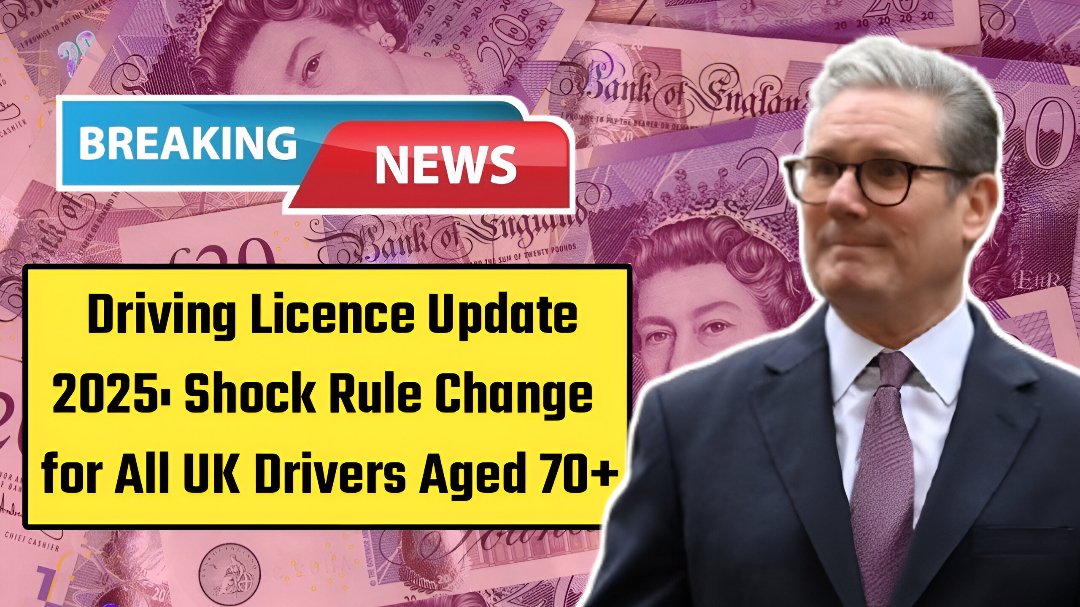From 2025, UK drivers aged 70 and above will face new driving licence rules that could have a significant impact on their ability to stay on the road. The Driver and Vehicle Licensing Agency (DVLA), in line with Department for Transport guidelines, has confirmed updated requirements that affect how older motorists renew their driving licences. Millions of senior drivers could be caught out if they are unaware of the changes, making it more important than ever to stay informed.
What Has Been Announced About Driving Licence Changes in 2025?
Currently, UK drivers must renew their licence every three years once they turn 70, providing self-certification that they are medically fit to continue driving. However, the new rules being introduced in 2025 will place greater emphasis on health and safety checks. The DVLA has confirmed that stricter renewal procedures will come into effect, including mandatory medical declarations and in some cases additional health assessments before a licence can be approved.

The aim is to balance road safety with fairness to older drivers. With an ageing population and a growing number of motorists staying behind the wheel into their 70s, 80s, and beyond, the government believes that updated rules are necessary to reduce risks and ensure that all drivers remain fit to drive.
Who Will Be Affected by the New Rules?
The new changes will specifically impact drivers aged 70 and over who need to renew their licences. While existing licence holders under 70 will continue to renew normally, those hitting the milestone age in 2025 will face the updated process.
Millions of drivers across England, Scotland, Wales, and Northern Ireland could be affected, as the DVLA estimates more than five million people in the UK are over 70 and still hold valid driving licences. Those who rely on their cars for independence, especially in rural areas with fewer public transport options, will need to pay close attention to the new requirements.
Why Are These Driving Licence Changes Being Introduced?
The primary reason for the changes is road safety. As people age, medical conditions such as impaired vision, slower reaction times, and other health challenges can affect driving ability. The government argues that stricter checks will help identify risks earlier and prevent accidents involving vulnerable road users.
Another reason is consistency. Other countries already require older drivers to undergo medical checks or shorter renewal periods, and the UK is now moving towards a more robust system. By ensuring that health assessments are a key part of the process, the government hopes to strike a balance between keeping older people mobile and ensuring roads remain safe.
What Will Older Drivers Need to Do in 2025?
From 2025, drivers aged 70+ will need to provide more detailed information when renewing their licence. This could include submitting a medical declaration signed by a GP or undergoing eyesight checks before approval. In some cases, the DVLA may request further evidence or refer drivers for additional tests if health conditions such as diabetes, heart disease, or epilepsy are disclosed.
The good news is that renewals will still be free of charge for over-70s, meaning no additional financial burden. However, the process could take longer due to the added medical checks, so drivers are advised to apply for renewal well in advance of their licence expiry date to avoid delays.
Concerns Raised by Pensioner Groups and Campaigners
While many welcome the focus on road safety, some campaigners and pensioner groups have expressed concerns about the changes. They argue that extra medical requirements could discourage older people from renewing their licences, leaving them isolated and dependent on others for travel.
There are also worries about the strain on NHS resources, as more older drivers may need GP appointments for medical sign-offs. Campaigners are calling on the government to ensure the process is efficient and accessible, so that older motorists are not unfairly penalised.
How These Changes Could Impact Daily Life for Seniors
For many people aged 70 and above, driving is not just a convenience but a necessity. It allows them to attend medical appointments, shop for essentials, and visit family and friends. Losing the ability to drive, or facing delays in licence renewal, could have a serious impact on their independence.
Rural communities, in particular, may feel the greatest effect. With limited public transport services in many areas, older drivers often rely heavily on their cars. Any disruption to licence renewals could leave them struggling to stay connected and active in their communities.
Final Thoughts on Driving Licence Updates in 2025
The driving licence changes for over-70s in 2025 represent one of the most significant updates in recent years. While the government insists the new rules are about improving safety, they will undoubtedly create challenges for many older drivers who depend on their cars for everyday life.
If you are approaching 70 or already over this age, it’s vital to stay updated on the new requirements, ensure your medical records are accurate, and prepare early for your licence renewal. By planning ahead, you can avoid unnecessary stress and continue enjoying the freedom of driving for as long as possible.
